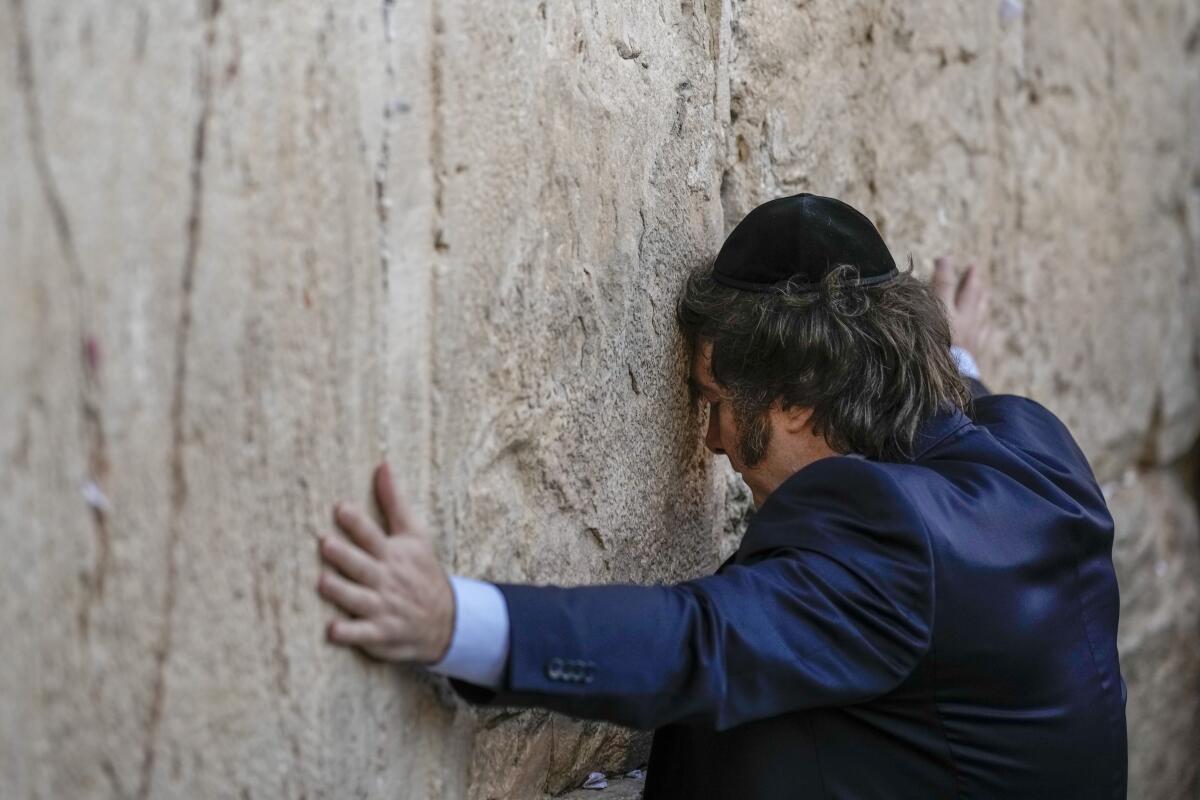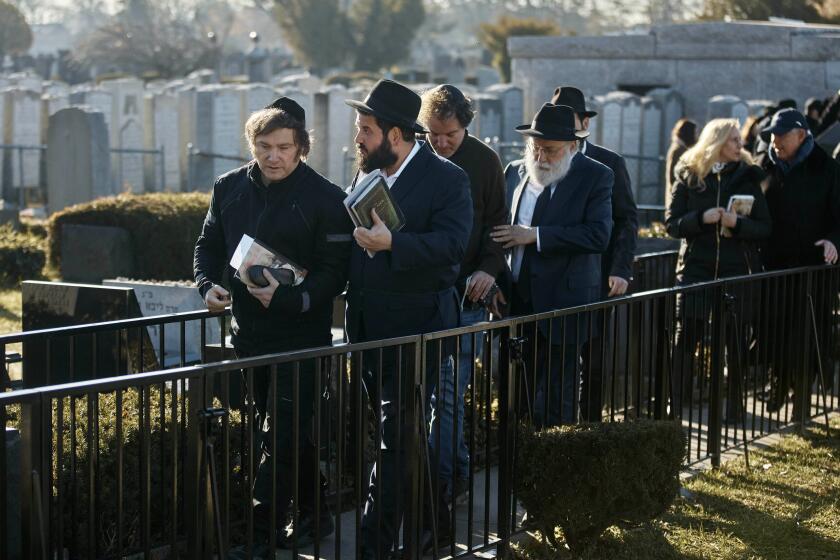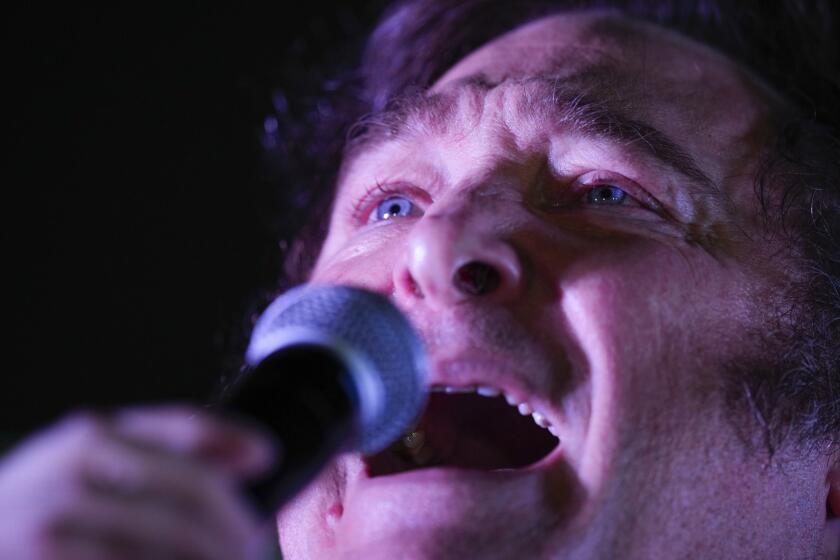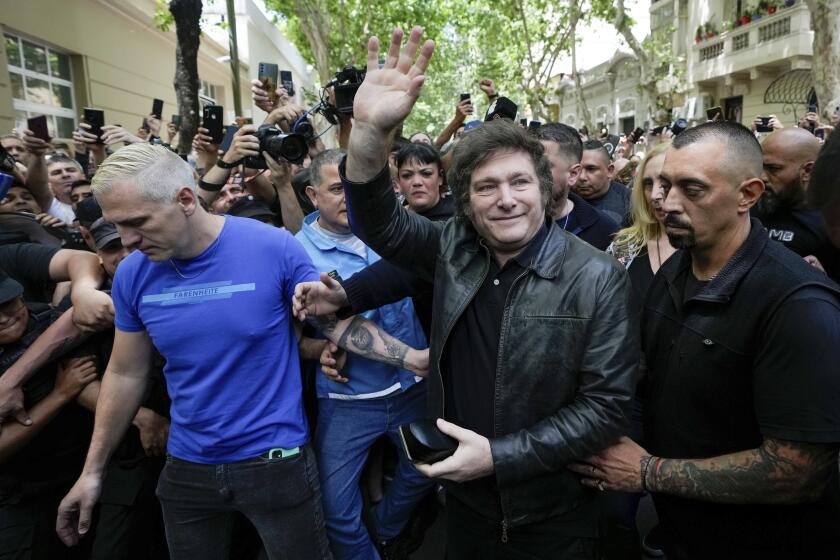President Milei’s surprising devotion to Judaism and Israel provokes tension in Argentina, beyond

- Share via
BUENOS AIRES — At the base of the sacred Western Wall in Jerusalem’s Old City, President Javier Milei of Argentina appeared to be in a spiritual trance.
With head and hands pressed against the ancient stone, he prayed with the Orthodox rabbi who introduced him to Judaism three years ago. Although born and raised Roman Catholic, Milei has increasingly shown public interest in Judaism and even expressed intentions to convert.
Stepping back from the wall, Milei broke down. He hugged Rabbi Shimon Axel Wahnish close, sobbing onto his shoulder.
“In that moment, I felt proud that we have such a determined leader, with such deep spiritual values,” Wahnish told the Associated Press in a recent interview, recalling their state trip to Israel in February.
For many Argentines, that pride was fraught with peril.
Breaking decades of policy precedent, Milei has gone further in his support of right-wing Israeli Prime Minister Benjamin Netanyahu’s government than perhaps any other world leader as Israel faces growing isolation over its bombardment and invasion of Gaza that has killed over 36,000 Palestinians and pushed the enclave to the brink of famine.
Argentina’s President-elect Javier Milei has shown public interest in Judaism, incorporating shofars at campaign rallies and visiting a rabbi’s tomb.
His posture could not stand in starker contrast to most of Latin America — where Bolivia and Colombia have severed ties with Israel and at least five regional countries, most recently Brazil, have pulled ambassadors from Tel Aviv.
“Among great nations that should be pillars of the free world, I see indifference in some and fear in others about standing on the side of truth,” Milei told Jewish community leaders at an event last month commemorating the 81st anniversary of the Warsaw Ghetto uprising. It was a veiled swipe at Western powers — including the United States — for criticizing Israeli military conduct.
The crowd leaped to its feet in applause.
The president’s supporters insist his newfound Jewish fervor has no bearing on his foreign policy. But Milei’s infatuation with Judaism and outspoken support for Israel has generated fears and exposed fissures within Argentina’s Jewish community, among the biggest in the world, and roiled relations with its neighbors.
Argentine Jews remain deeply scarred by a pair of lethal bombings targeting Israel’s embassy in 1992 and the Argentine Jewish Mutual Assn., a community center known by its Spanish acronym AMIA, in 1994. Authorities allege Iran plotted the attacks and Lebanon’s Hezbollah militant group carried them out. No one has been held responsible. Argentina’s investigation has been mired in controversy.
Argentina’s next president, Javier Milei, is a culture-warring Trump fan who opposes abortion, calls the pope an “imbecile” and says sex education is a Marxist plot.
“Milei has a messianic mind, and this is quite dangerous,” said Diana Malamud, whose husband was among the 85 people killed in the AMIA attack. “His policies can not only stoke conflicts at the international level ... but also generate antisemitism within our country.”
Milei’s curiosity about Judaism began as a kind of penitence in 2021, when he faced accusations of harboring pro-Nazi sympathies and wanted to prove in speech that he bore no animus toward Jews. He connected with Sephardic leader Rabbi Wahnish to have “a chat that was supposed to last 10 minutes and ended two hours later,” Wahnish said.
As Milei evolved from TV pundit to “anarcho-capitalist” president, Wahnish guided him through the study of Torah. Seeking common ground between his vision of radical libertarianism and the prophecy of the Old Testament, Milei’s casual interest morphed into a regular religious practice.
Wahnish, recently appointed Argentina’s ambassador to Israel, declined to comment on Milei’s conversion.
“In Judaism and Moses, Milei sees a cultural and spiritual revolution toward freedom,” Wahnish said. Since childhood, he added, Milei “felt Moses was his idol, his hero.”
Populist Javier Milei wins Argentina’s presidential election, swinging the country to the right after a polarized campaign in which he promised a dramatic shake-up.
Milei, who owns four clones of his dead dog Conan, has never been the most conventional occupant of Argentina’s highest office. Still, his foray into Judaism has come as a particular surprise.
On the campaign trail, Milei quoted the Torah, made multiple Brooklyn pilgrimages to the tomb of influential Hasidic leader Menachem Mendel Schneerson and sounded the shofar, the ram’s-horn trumpet blasted during the Jewish High Holy Days, to close his electoral campaign.
Ahead of Milei’s victory, nearly 4,000 Argentine Jewish intellectuals signed a petition voicing concern over Milei’s “political use of Judaism.”
“It’s perverse ... to use the shofar, which is played during religious ceremonies, to announce himself,” said Pablo Gorodneff, secretary-general of the progressive Argentine Jewish Appeal group. “It makes me very frustrated, very sad.”
As fighting raged in Gaza, Milei flew to Israel for his first foreign visit and praised Netanyahu without reservation. Following in the footsteps of former U.S. President Trump, he pledged to move Argentina’s Embassy from a beachfront bastion near Tel Aviv to the contested capital of Jerusalem — aggravating an emotional issue at the heart of the conflict. Netanyahu called Milei “a great friend.” Hamas called him “a partner of the Zionist occupier.”
Last month, Milei’s government upended Argentina’s traditional recognition of Palestinian statehood, joining the U.S. and Israel to vote against Palestinian membership at the U.N.
In Argentina, warring drug traffickers are banding together and terrorizing parts of the city of Rosario that were previously considered safe.
His foreign policy shift has thrilled Jewish community leaders, but also left them on edge.
“If Milei’s supposed defense of Israel is an attack on Palestinian rights, it puts the Jewish community in Argentina at risk,” said Héctor Shalom, director of Argentina’s Anne Frank Center. “The decades of impunity for past attacks show our vulnerability.”
The 1994 bombing, Argentina’s most notorious cold case, still spreads unease. After Hamas’ Oct. 7 attack, the mood in the Jewish community went from worried to alarmed.
Jewish high schools requested that students stop wearing their uniforms, so as not to identify as Jewish. Authorities jacked up security at synagogues. Two bomb scares emptied out the AMIA building.
“Security levels have always been high but now there is a much greater sensitivity,” said Amos Linetzky, head of AMIA.
Government officials have also grown anxious, lashing out at Iran and warning that the Israel-Hamas war has stoked the embers of Islamic militancy and blown them all the way to Latin America.
Argentine President Javier Milei announces sweeping economic plans, including easing government regulation and allowing privatization of state-run industries.
Upon news of the first Iranian assault on Israeli territory April 14, local media reported Milei’s pro-Israel stance had made him a target. He cut his state visit to Denmark short and flew home to convene a crisis committee alongside the Israeli ambassador.
Milei’s hard-line security minister, Patricia Bullrich, singled out left-wing neighbors Bolivia and Chile as Islamist hotbeds, ordering reinforcements to Argentina’s northern border.
“We are on high alert,” Bullrich said, alleging that Bolivia — which last year struck a defense agreement with Iran — teems with Iranian Revolutionary Guard operatives. “Politically correct messages like calling for peace are not Argentina’s position.”
Without providing evidence, Bullrich also claimed that Chile — home to the largest Palestinian population outside the Arab world — hosts Hezbollah.
The accusations, decried as baseless by Bolivia and Chile, prompted both governments to pull their ambassadors from Buenos Aires.
On Saturday, the Organization of Islamic Cooperation, a 57-member group describing itself as “the collective voice of the Muslim world,” issued a furious denunciation of what it described as Milei’s anti-Islamic rhetoric.
For years, U.S. and Argentine intelligence services have subjected the Triple Frontier, where Argentina, Brazil and Paraguay meet, to intense surveillance, scouring the large population of Lebanese and Syrian immigrants for Islamist sympathies.
Argentina’s annual inflation soared to 211.4% in 2023, reflecting the impact of a series of shock measures by new right-wing President Javier Milei.
“One of the things I don’t think gets enough attention is how long Hezbollah has had a presence in our hemisphere,” Sen. Marco Rubio (R-Fla.) told a Senate Foreign Relations Committee this spring.
Washington claims Hezbollah funds its activities through drug traffickers in the area. The U.S. Treasury has sanctioned dozens of individuals in South America over alleged ties to Hezbollah, most recently last fall. Authorities have reported thwarting attacks, with Israel’s Mossad spy agency helping Brazil arrest alleged Hezbollah recruits last November.
Hezbollah denies running operations in the region.
“What would Hezbollah want with Latin America?” the group’s spokesperson, Rana Sahili, asked the AP. She accused Milei of playing loose with facts to score points in a “political game.”
Experts say the true threat lies somewhere in the middle.
“Some say Hezbollah’s presence in Latin America is a complete fabrication, while others say the group uses the region as a base and we’re doomed,” said Fernando Brancoli at the Federal University of Rio de Janeiro in Brazil.
“Neither is correct.”
Debre and Calatrava write for the Associated Press.
More to Read
Sign up for Essential California
The most important California stories and recommendations in your inbox every morning.
You may occasionally receive promotional content from the Los Angeles Times.
















